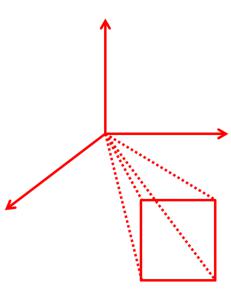Sermon preached at Burke UMC, September 3rd & 4th, 2011
Text: Romans 13:8-14
My wife and I have a difference of opinion when it comes to sharing food. I feel like if I buy a sandwich, then that means that I get to eat the whole thing. If she wants a taste, then she should buy her own sandwich. Mooch is a word that I use for people who try to eat off my sandwich rather than paying for their own. How many of y’all have ever been a mooch? I’ve been a mooch before too.
Our society puts a lot of value in not being a mooch, living in such a way that you never accrue any debt from anybody. Romans 13:8 seems to speak our language: Owe no one anything. On the sidewalks in Mexico City, there’s a scam in which a shoe shiner starts to rub down your shoes without your permission to create a “debt” that he can demand payment for. My friend Bobby got ensnared one time and had to pay a guy $20 for polishing his sneakers. So for the rest of that day, whenever anybody said, “Amigo!” and walked towards us, I would run away screaming, “Mis zapatos son limpios! My shoes are clean!”
That’s the image that comes to mind when I think of how it seems like I never stop running from people who are trying to put me in debt. With all the credit card offers in the mail, it’s not good enough to throw them away because then somebody will steal your identity. You have to physically cut up the fake credit cards and shred the paper. It seems like 95% of all mail is either people trying to put you in debt or people trying to collect on the debt that you’re already in.
But financial debt isn’t the only form of debt that we run from. There’s a ton of debt in the world of social obligations. The older our sons get, the more we learn about the debt system of birthday party invitations. Because if you invite someone to your son’s birthday party, you’re really saying: “Guess what, you need to buy a present for my son,” unless of course you write on the invitation, “Please don’t bring presents,” but then does that mean that the little girl you’re inviting shouldn’t expect any presents at her birthday party to which she has to invite your son? What if she wants birthday presents? It gets complicated.
The best way to stay out of social debt is not to throw birthday parties. And not to go out to dinner with your friends for that matter, because what if the waiter won’t split the check? Modern life is like walking through a forest of obligations and debts that grab onto you like spider webs. If we stay on top of bills, we can avoid financial debt, but the only way to avoid social debt is to find somewhere to sit in the fetal position and hide from interacting with other people.
In the ancient Roman times when the apostle Paul was writing, social debt was a lot more overtly recognized. Roman society was organized according to what is called a patronage system. The way to gain political power was to do favors for powerful people so they would be indebted to you. You could throw parties for them if you had the money, or if you couldn’t afford to throw parties, you could at least throw rotten fruit at the chariots of their enemies. Some “debts” were acknowledged and compensated; others weren’t. The art to moving up the social ladder was to figure out how to make your generosity stick to somebody more powerful. Everyone was like a Mexico City shoe shiner, constantly scoping out opportunities to gain power by being an unsolicited benefactor of other people.
Unlike our culture, whose values of self-reliance and individual responsibility make us obsess over avoiding social indebtedness, Roman civilization very openly acknowledged that everyone except the emperor was indebted to somebody. Debt didn’t mean fiscal irresponsibility; it was inherent to every relationship. So when Paul writes, “Owe no one anything except to love one another” in a letter to first-century Romans, he is making a radically counter-cultural statement that repudiates the basic building block of the entire Roman social pyramid.
We need to receive Paul’s words in the full counter-cultural force he intended. Paul isn’t just telling us that the way to best love our neighbor is to “owe nobody anything” by paying our bills and staying off our neighbor’s grass. Paul is calling us to abandon an approach to life in which how we treat others is motivated by our obsession with avoiding debt. There’s a subtlety in the original Greek that doesn’t come through in the translation. In Greek, Paul says, Μηδενὶ μηδὲν ὀφείλετε. Try that one time: medeni meden opheilete. Because of the way verbs work in Greek, opheilete can be either a command or a statement. Paul is either commanding us not to owe anything to anybody or he is explaining to us that we don’t owe anything to anybody. I think he’s saying both things at the same time.
The reason why we don’t owe anybody anything and why we shouldn’t live as if we do is because every single one of us owes everything to God. We can’t pay God back for the air we breathe or the soil that was used to grow every piece of food that we have ever put into our bodies, not to mention the brain cells that store whatever knowledge we have used to earn a living. Not only are we indebted to God for our existence, but we have accrued an infinite spiritual debt through thousands of sins that hurt people God cares about.
But here’s the good news that Paul has spent most of the preceding chapters of his letter to the Romans explaining. We owe God everything but God came to Earth in the form of Jesus to prove that He’s not a collection agency. The way that God proves this by paying Himself back with the self-sacrifice that He makes through Jesus on the cross. Our infinite debt is real enough that Jesus had to pay the price. But if we accept Jesus’ cancellation of our debt and give ourselves to Him as our only benefactor, then we can live as people who don’t owe anything to anybody except to love one another. Loving one another is not something that we do out of guilt or indebtedness, but in gratitude for the freedom that Jesus has bought for us on the cross. Paul clarifies that the directions for living that the Bible has given us are not rules to be followed out of obligation or in order to earn God’s favor. They are illuminations of how we can best love our neighbor which is what we yearn to do with our whole heart once we are liberated from the oppressive way of living defined by debt and social obligations.
When our switch first gets flipped and we discover how it feels to be spiritually debt-free and to live for the sake of God’s love, it’s like waking up for the first time after years of sleep-walking. Don’t get me wrong, if you live to be a vessel of God’s love for your neighbor, you’re not going to be a mooch. You won’t want to be a parasite, a freeloader, or a crook because all you’ll want is to bring glory and honor to the One who has forgiven your debt once and for all. When we are truly grateful, we lay aside the works of darkness and put on the armor of light, not for the purpose of proving anything about ourselves or paying down a debt to God that’s impossible to pay, but because we want for other people to step into the light of the amazing new freedom that we have in Jesus Christ. So say it with me again: Μηδενὶ μηδὲν ὀφείλετε. And here’s the rest of it: εἰ μὴ τὸ ἀλλήλους ἀγαπᾶν. That’s one of the coolest sentences ever written. Owe no one anything; just love one another.















